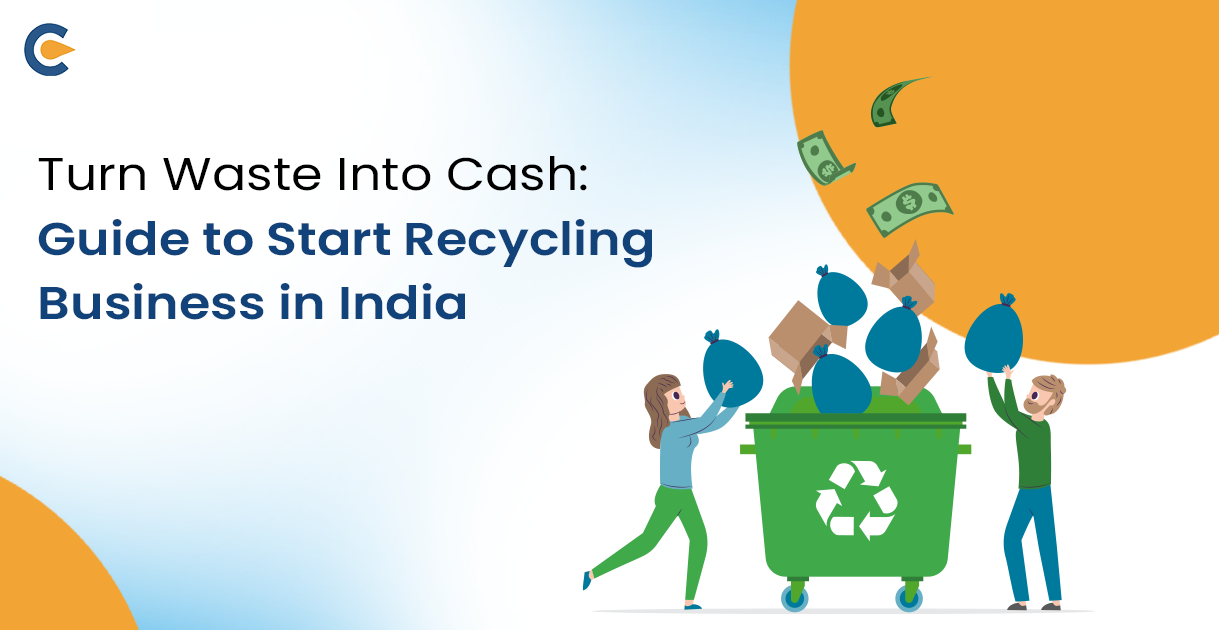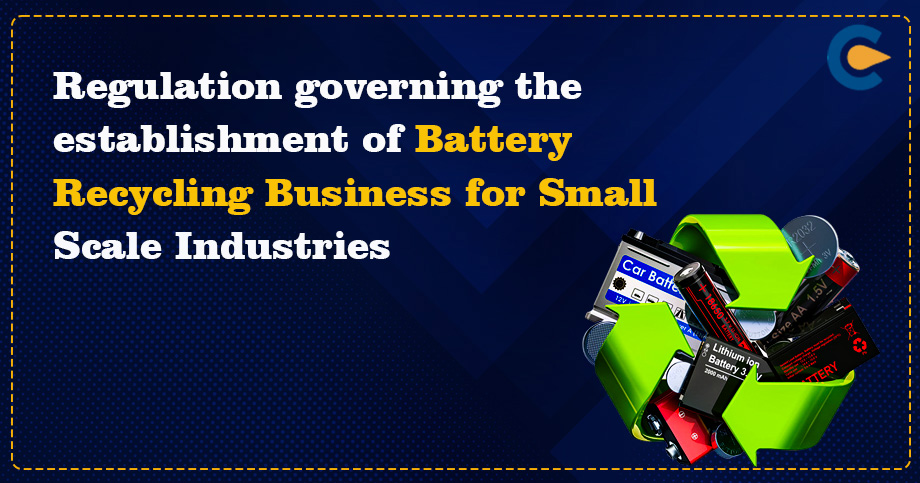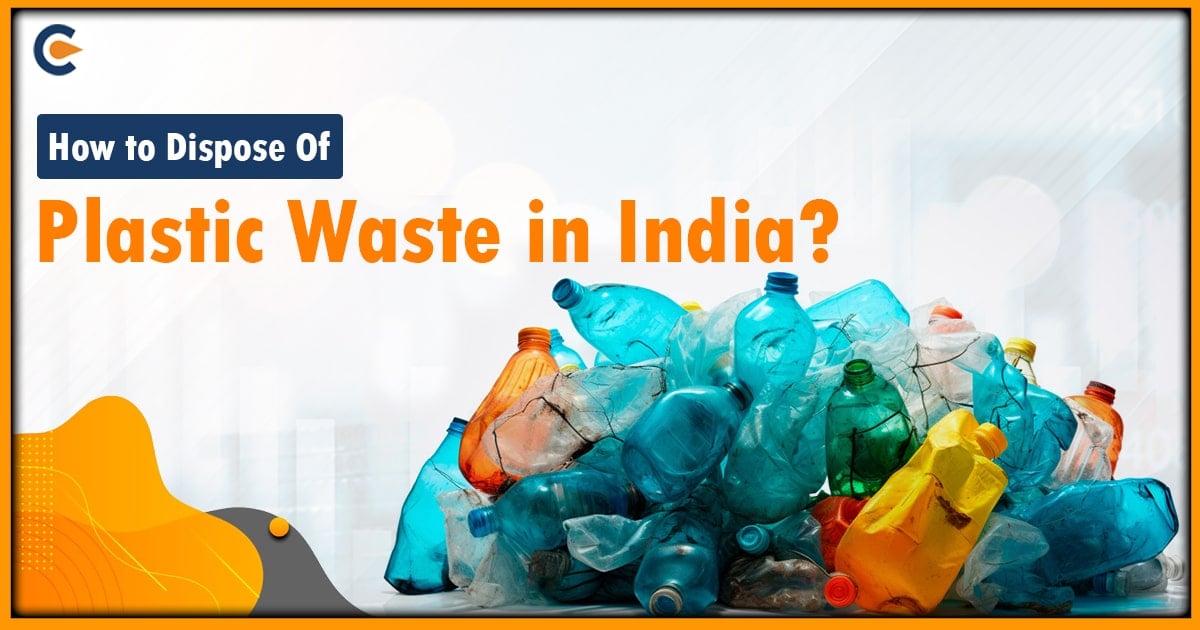Recycling business in India has been widely adopted by companies and governments. A recycling business in India is seeing very high growth. Several companies are experimenting with using recycled materials to create goods. Recycling contributes to the preservation of the environment, the reduction of carbon emissions, and the conservation of natural resources. From a commercial perspective, a recycling business is less costly, requires fewer raw materials, and generates more employment possibilities than garbage collection and disposal. Creating a business selling recycled materials may be quite profitable, especially considering the increasing need for these kinds of initiatives.
The market is quite dependable as there is a clear worldwide trend toward sustainable living. Though this facilitates entry into the market, it also increases competition. You can run a prosperous and healthy business if you have a solid plan, adhere to strong financial and legal procedures, and do exceptional marketing.
In this blog, we are going to discuss the essential registration for recycling business in India, types of recycling business, steps for starting a recycling business in India, and other related information.
Importance of Recycling in India
There has been an increase in the importance of recycling in India; pollution has increased to a large level. The handling of waste has a significant impact on both our health and the environment. Inadequate garbage disposal practices can result in many environmental issues, such as pollution and tainted water supplies. Recycling is one of the best waste management strategies. The process of turning waste resources into new goods is known as recycling. To make new goods, waste materials must be gathered, sorted, and processed. Recycling lowers greenhouse gas emissions, the amount of garbage that ends up in landfills, and the utilization of natural resources.
Steps for Starting a Recycling Business in India
There are some general steps for starting a recycling business in India, which are all the same for each type of recycling business in India.
- The first step is to conduct detailed research and plan the whole business. It is vital to understand the market before starting a recycling business in India.
- After having an idea about the market for the recycling business, make a business plan for the same. A business plan will include information related to the objectives of the business, goals, investments, strategies, etc.
- Just planning the business and making the business plan is not enough. It is equally important to register the recycling business. The recycling business will not be considered a legal business without a company registration.
- After registration, plan the details for the location of the recycling business, along with raw materials that will be required and the machinery as well.
- The next step is to hire people who will help you out in the recycling business in India.
- It is very important to make people aware of your recycling business in India. Create different plans for attracting clients. Register for the trademark and patent as well as per the requirement.
Essential Registration for Recycling Business in India
It is required to register with the necessary information that the Indian government has set in order to begin a recycling business. The following are the essential registration for recycling businesses in India:
1. Goods and Service Tax Registration
A GST registration is compulsory for all businesses in India that are doing business, whether they are selling, delivering, or purchasing goods or services of any kind. Businesses that have revenue exceeding the threshold of Rs. 40 lakh, Rs. 20 lakh, or Rs. 10 lakh, depending on the situation, are required to register as regular taxable persons under the Goods and Services Tax(GST).
2. Company Registration
All the companies in India have to register with the Registrar of Companies (ROC). Without registering the company, the business will be considered illegal. Company registration gives the business a legal identity through which the company can sue others and can be sued by others. A company registration adds to the credibility and trust of the company.
3. MSME Registration
A corporation, trust, partnership firm, proprietorship, or society that has an annual revenue of less than Rs. 250 crore and an investment of less than Rs. 50 crore is qualified for MSME registration. Micro, Small, and Medium Enterprises (MSMEs) in India can register as MSMEs to enable them to get incentives that would help them start and expand their enterprises. It is not required to obtain the MSME registration. The government of India defines MSME as being limited to the manufacturing and service sectors; trade enterprises are not included in the plan.
4. State Pollution Control Board Permission
To operate or run any kind of project, a person has to get the Consent to Operate from the State Pollution Control Board (SPCB). The owner has to register on SPCB/PCC’s official website. He then has to submit an application for specific recycling business permission and gather all the necessary paperwork. The entire application is examined by authorities in the following stages for verification and authenticity.
5. License of the Factory
The Factory Act of 1948 mandates that all factory owners shall register their properties with local authorities before opening for business. A factory license is a legal document that grants you permission from authorities to engage in manufacturing. The Factories Act of 1948 states that a plant cannot apply for factory registration unless its building plan has been approved by the labour and employment department. In order to safeguard worker safety, this Act also governs the registration and renewal of factory licenses.
Having this essential registration for a recycling business in India, along with other licenses and permits that are required, can make a business compliant with all rules and laws.
Who are the Potential Customers for the Recycling Business in India?
The demand for items made by using recycled materials is also rising daily. The items that are responsible for satisfying today’s basic necessities for society are always made via the recycling process, which is why the recycling industry is thriving, thanks to the procedure’s significance and utility.
Having an idea about the potential customers and the market for recycling business in India beforehand makes it very easy to target the consumers directly and make the business successful. Recycled products are created from waste materials and fall within the small-scale B2B (business to business) industry. The product generated from the recycling process is needed in many types of production units connected to the area of everyday usage (B2C-business to customer).
Reasons to Start a Recycling Business in India
There are many reasons to start a recycling business in India
1. Huge Potential Market
The recycling business has a huge potential market. India produces millions of tons of garbage annually, which opens up a huge opportunity for companies that engage in recycling. From paper and plastics to technological waste and biological materials, the possibilities are virtually limitless. In addition to creating useful goods and raw materials, you can support the circular economy by utilizing this enormous market potential.
2. Assistance from the Government
The recycling business gets many different types of assistance from the government. The Indian government has put in place a number of laws and programs to encourage recycling because it understands how important waste management is. The government wants to collaborate with groups who are trying to improve e-waste management and handling in India as part of the waste to best program.
3. Environmental Advantages
With starting a recycling business, many environmental advantages can be availed. Recycling is essential for lowering pollution and protecting the environment. Recycling wastes helps cut greenhouse gas emissions and conserves energy and water resources when it is not dumped in landfills or burned.
4. Cutting Down on Resource Wastage
Cutting down on resource wastage is one of the key advantages of starting a recycling business in India. Reducing resource exploitation and increasing resource consumption efficiency in manufacturing businesses are considered important goals that can be achieved through recycling. As a result, recycling has become a very popular industry.
5. Boost Your Business Mindset
Growing environmental consciousness and interest in sustainable practices such as plastic neutrality and sustainability will drive up demand for companies offering recycling services. Consumers of today actively seek for environmentally friendly and sustainable solutions.
Types of Recycling Business in India
There are various types of recycling businesses in India, from which you can choose one in accordance with your aims and goals.
Plastic Recycling Business
Establishing a plastic recycling business in India might entail gathering and processing various kinds of plastic waste to make new goods like PET bottles and plastic granules. As people are now very aware of the need to protect degrading environmental conditions, this is one of the common business ideas used in India.
Glass Recycling Business
The textile industry’s water-intensive procedures and non-biodegradable materials make it one of the biggest sources of pollution in the world. Gathering used clothing and textiles and classifying them according to kind and quality are the first steps in starting a textile recycling business in India. While the textiles which are non-usable can be shredded and utilized for industrial purposes like padding or insulation, the reusable textiles can be sold to thrift businesses.
Construction and Demolition Waste Recycling Business
A substantial amount of waste materials are produced by the construction industry during the building and demolition processes. Establishing a recycling business in India for building and demolition waste allows you to separate materials, such as brick, wood, metal, and concrete, for reuse or resale. Employing recycled materials not only lessens the impact on the environment but also lowers building.
Batteries Recycling Business
Establishing a battery recycling business in India may include gathering spent batteries and recovering important metals for recycling, such as cobalt, nickel, and lead. The battery recycling market is quite huge in the world.
Metal Scrap Recycling Business
In India, recycling metal scrap is a well-established business concept. The nation’s GDP is greatly boosted by the metal sector, which also employs millions of people. You can make a good profit by gathering metal scraps from homes or businesses and selling them to foundries or steel mills. Metals with strong market value and high recycling rates include copper, steel, aluminium, and iron.
Tires Recycling Business
Millions of old tires are produced annually in India, which presents serious environmental problems. Obtaining used tires and processing them to create rubber crumbs or salvageable elements for different uses is the first step in starting a tire recycling business in India.
E-Waste Recycling Business
Establishing an e-waste recycling business in India entails gathering and disassembling electronic gadgets in order to salvage precious components for recycling, such as copper, silver, and gold.
Organic Waste Recycling Business
Organic waste recycling has become extremely popular as environmental preservation and organic farming have been more widely recognized. Getting started with an organic waste recycling business entails gathering agricultural residue, food waste, and garden trash and turning them into organic compost. You can sell the compost to gardeners or farmers. This company supports sustainable agriculture in addition to reducing trash.
Conclusion
According to expert predictions, the global waste production capacity will reach 2.2 billion tons by 2025. Even while waste constitutes a significant risk, it also presents chances for development and prosperity for those looking to launch a low-cost recycling firm. And with the guide provided above, you can easily start a recycling business in India.
Frequently Asked Questions (FAQs)
India is a nation whose industrial sector and population are expanding quickly. The necessity for sustainable waste management has increased due to increases in production and consumption. Recycling is a profitable commercial venture in addition to a sustainable option.
Recycling may result in six times more employment being created in India by 2030 and an additional 14-lakh crore in cost savings-roughly 11 per cent of our GDP annually.
According to projections, the Indian plastic recycling market will reach a value of USD 520.68 million in 2022 and expand at a compound annual growth rate (CAGR) of 7.58%.
Determine which marketing avenues will help you reach your target most effectively. A combination of offline and online platforms, including email marketing, social media, local advertising, and collaborations with other eco-friendly companies, should be taken into consideration.
Indeed, recycling PVC is a successful commercial venture. This substance finds application in the production of tanks, pipelines, and blinds. It is a non-biodegradable trash that is thrown away in large quantities annually, much like plastic.
Waste made of plastic does not biodegrade. It is a major environmental contaminant, contributing to annual increases in air, land, and water contamination. The fact that it is recyclable and reusable is a plus, as tons of material are thrown away every year. Thus, recycling plastic is not just necessary now but also a need of an hour.
Yes, one can start a scrap metal recycling business with minimum investment. Furthermore, it’s a highly profitable avenue for entrepreneurs.
If you have a solid plan, adhere to strong financial and legal procedures, and do exceptional marketing, you can run a prosperous and healthy business.
Large sums of money are needed to implement environmentally friendly company concepts based on sustainable development models. Solar power plants, windmills, hydroelectric power plants, and geothermal power plants are a few notable examples of these.
Carton box recycling, scrap metal recycling, computer recycling, tire recycling, aluminium can recycling, glass recycling, wood or furniture recycling, utensil recycling, agricultural waste recycling, and recycling solid wastes to build bricks are some of the several types of recycling enterprises.
Paper and cardboard, plastic bottles and containers, aluminium cans, glass bottles, and certain metals are frequently sought-after recycled products.
Expanded polystyrene, sometimes known as Styrofoam, is generally thought to be the substance that is most difficult to recycle. Since its bulky nature and low weight, recycling presents difficulties since it needs specific equipment and procedures to be broken down and recycled effectively.
Read our Article: How To Start A Vehicle E-Waste Recycling Business?











